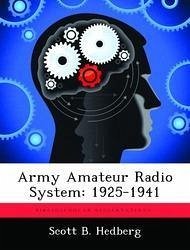This monograph conducts a historical study of the Army Amateur Radio System, the predecessor to the Military Auxiliary Radio System (MARS). In 2009, the Department of Defense changed the MARS mission to support homeland security functions by using MARS to provide backup emergency communications to local, state, and federal authorities. Viewed as a new direction for MARS, the responsibility of providing emergency communications is the same mission that was ably conducted by the Army Amateur Radio System (AARS) prior to the United States entry into World War II. By understanding the history of the Army Amateur Radio System, MARS can better meet the challenges it faces today. The AARS was formed in 1925 to provide a pool of trained radio operators to augment the Signal Corps during mobilization in time of war and provide an extension of the Signal Corps' radio network to support civil authority with natural disaster relief efforts. While supporting military goals, the organization was composed of volunteer civilians who were accomplished radio amateurs. The AARS succeeded in developing the proficiency of its radio operators as demonstrated by the support provided to government authorities during natural disaster relief efforts. However, on the eve of the United Sates' entry into World War II, the Army Amateur Radio System's membership was significantly underdeveloped in numbers to provide significant manpower to augment the Signal Corps' mobilization for war.
Hinweis: Dieser Artikel kann nur an eine deutsche Lieferadresse ausgeliefert werden.
Hinweis: Dieser Artikel kann nur an eine deutsche Lieferadresse ausgeliefert werden.








